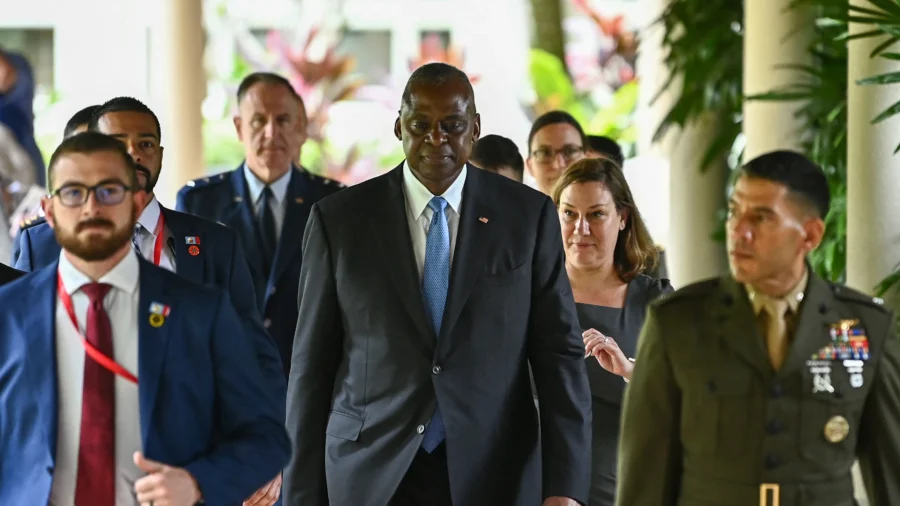U.S. Secretary of Defense Lloyd Austin met with his Chinese counterpart, Adm. Dong Jun, on Friday, the first in-person exchange between the two big powers’ defense ministers in 18 months.
The high-level military-to-military contact took place against a backdrop of rising tensions between the United States and communist China over a wide range of issues, from Beijing’s aid to Moscow’s war efforts to its sovereign claims of democratic Taiwan.
Mr. Austin met with Adm. Dong on the sidelines of the Shangri-La Dialogue, a premier security summit held annually in Singapore. The two defense leaders discussed global and regional security dynamics, including Taiwan and the South China Sea.
According to the Pentagon’s readout, Mr. Austin delivered the U.S. concerns about the Chinese military’s “provocative” activities around Taiwan.
Mr. Austin told Adm. Dong that Beijing “should not use Taiwan’s political transition—part of a normal, routine democratic process—as a pretext for coercive measures,” Maj. Gen. Patrick Ryder, the Pentagon press secretary, said in a statement following the meeting.
Tensions across the Taiwan Strait heightened this month as the Chinese military staged large-scale exercises in the sea and air spaces around Taiwan. The war games involving the Chinese navy, air force, and rocket forces started just days after the democratic-governed island saw its new president, Lai Ching-te, sworn in, drawing criticism from Washington and U.S. lawmakers.
According to the defense ministry in Taipei, 111 Chinese military aircraft and 46 Chinese naval vessels were detected during the two-day military drills. The People’s Liberation Army (PLA) cast the military exercises as a “strong punishment” for “independence forces” and a test of its capability to “seize power” in Taiwan.
The Chinese Communist Party (CCP), which has never ruled Taiwan, considers the self-governed island as a renegade province and has not ruled out the possibility of using force to bring the self-ruled island under its control.
While the United States does not have diplomatic relations with Taiwan, it maintains robust ties with the democratic island under a framework set out in the Taiwan Relations Act, which obliges Washington to provide Taipei with the means to defend itself.
During the meeting with Adm. Dong, Mr. Austin underscored the U.S. commitment to “its longstanding one China policy, which is guided by the Taiwan Relations Act, the Three U.S.-China Joint Communiques, and the Six Assurances,” the Pentagon statement reads. “He also reaffirmed the importance of peace and stability across the Taiwan Strait.”
The meeting also comes as the CCP becomes increasingly assertive in pressing its claim to the South China Sea, which has led to an increasing number of direct conflicts with other countries in the region, most notably the Philippines and Vietnam.
The United States, meanwhile, has been ramping up military exercises in the region with its allies to underscore its “free and open Indo-Pacific” concept, which emphasizes freedom of navigation through the contested waters, including the Taiwan Strait.
Mr. Austin reiterated the American position to Adm. Dong during their talks.
Mr. Austin “made clear that the United States will continue to fly, sail, and operate—safely and responsibly—wherever international law allows,” Gen. Ryder said in the statement. “He underscored the importance of respect for high seas freedom of navigation guaranteed under international law, especially in the South China Sea.”
More Military-to-Military Communications
The meeting between Mr. Austin and Adm. Dong lasted about 75 minutes, longer than expected, the spokesperson for Beijing’s defense ministry, Senior Col. Wu Qian, told reporters later on Friday, describing the bilateral talks as “positive, pragmatic, and constructive.”
The two sides also discussed plans for future exchanges between their militaries, he said, without elaborating.
According to the Pentagon’s statement, the United States and China have agreed to resume telephone conversations between theater commanders “in the coming months” and plan to convene “a crisis-communications working group by the end of the year.”
Communications between China and the United States have plummeted in recent years, indicating a precipitous cooling of relations between the two rivals.
In August 2022, following then-House Speaker Nancy Pelosi’s visit to Taiwan, the CCP cut down high-level military communication with the United States. Some military-to-military communications were gradually restored following a high-profile meeting between President Joe Biden and CCP leader Xi Jinping in California in November 2023.
Friday’s meeting marked the first in-person meeting since Adm. Dong assumed the role of the Chinese military’s top diplomat in December 2023.
Adm. Dong, a former navy chief, succeeded his predecessor, Gen. Li Shangfu, who was abruptly dismissed following a two-month unexplained absence amid reports of a broad anti-corruption campaign of the Chinese military.
Mr. Austin is scheduled to address the forum on Saturday morning, while Adm. Dong is set to speak on Sunday.
Andrew Thornebrooke and The Associated Press contributed to this report.
From The Epoch Times

